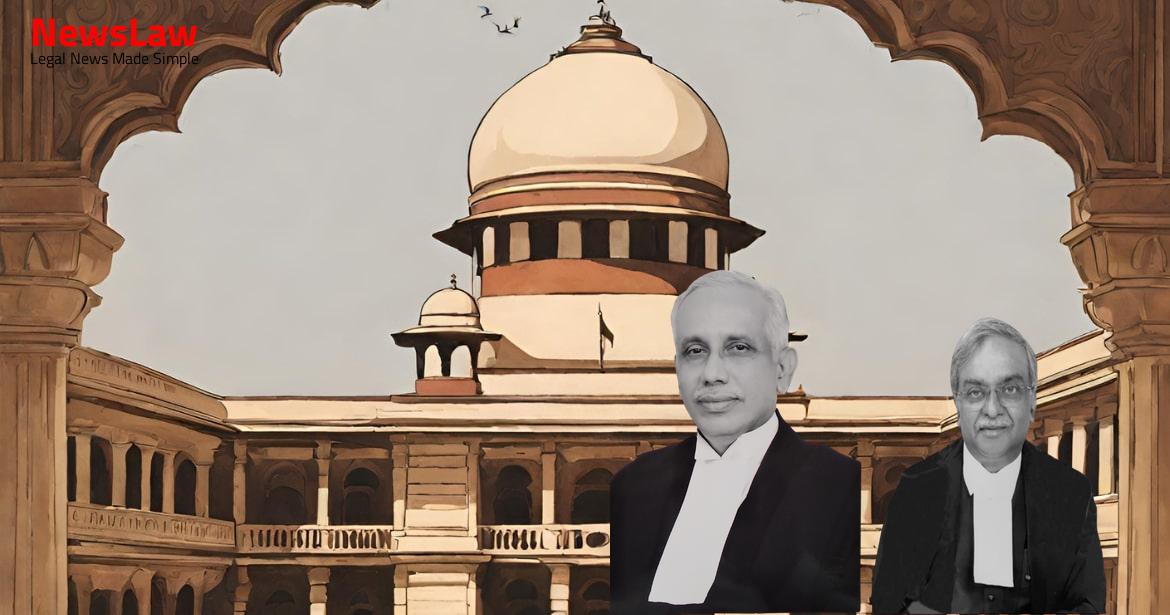Read about the recent judgment delivered by the Supreme Court Of India in the case of Representing Undertrial Prisoners v. Union of India & Ors. The judgment focuses on the rights of undertrial prisoners and the significance of ensuring fair bail conditions. It sheds light on the importance of upholding constitutional rights while imposing necessary conditions. Find out more about this landmark ruling and its implications.
Facts
- The appellant was arrested on 21 May 2014.
- The appellant was ordered to be enlarged on bail on 31 May 2022 with terms and conditions based on directions from the Supreme Court Legal Aid Committee Representing Undertrial Prisoners v. Union of India & Ors.
- The bail amount was set at Rs.1,00,000/- with two sureties.
- One of the conditions for bail required a certificate of assurance from the High Commission of Nigeria to ensure the appellant does not leave the country and appears before the Special Judge when required.
Also Read: Judgment on Interim Stay of Bail Orders: The Case of Liberty vs. Judicial Discretion
Analysis
- Bail conditions must be consistent with the object of imposing conditions and the accused’s Constitutional rights should only be curtailed to the minimum extent required.
- Even an accused undergoing a sentence in prison retains the rights guaranteed by Article 21 of the Constitution.
- The accused should cooperate with the investigation when granted bail before the final report or chargesheet is filed, but cooperation does not mean confessing.
- Conditions imposed while granting bail cannot be arbitrary, fanciful, or extend beyond the ends of the provision.
- The phrase ‘interest of justice’ in Section 437(3) of the CrPC means ‘good administration of justice’ and broader interpretations should be avoided.
- Undertrial accused, including foreigners, cannot be deprived of their rights guaranteed under Article 21.
- Imposing conditions of periodically reporting to the police station/Court or not traveling abroad without permission may be valid, but constant vigilance on the accused’s movements is not permissible.
- The presumption of innocence applies so long as the accused is not held guilty.
- Bail conditions aim to ensure the accused does not interfere with the investigation, remains available, does not tamper with evidence, and does not obstruct the trial process.
- Accused cannot be subjected to irrelevant conditions, and the ‘interest of justice’ in Section 437(3) of CrPC should not be given a broader meaning.
- Granting anticipatory bail allows for the imposition of conditions as provided in Section 437(3) of the CrPC, but these conditions must be necessary, just, and efficacious.
- The condition of dropping a PIN on Google Maps was imposed by the Court as a bail condition.
- The Court emphasized that dropping a PIN does not enable real-time tracking of the user or their device.
- Google Maps allows users to share a PIN with full control over who can access it.
- The Court clarified that the condition of dropping a PIN is redundant and does not assist law enforcement agencies in monitoring the accused in real-time.
- The Court highlighted that bail conditions must not be impossible for the accused to comply with and must not impinge on their privacy rights.
- The Court indicated that if the Embassy/High Commission does not issue a required certificate within a reasonable time, the condition can be dispensed with to prevent denial of bail to the accused.
- The Court established that the privacy of the accused must be protected, and any conditions that infringe upon this right will be deemed invalid.
- Undertrial accused entitled to be released on bail must deposit passport or file an affidavit if not holding one.
- Conditions for bail release based on the punishment provided for the offense.
- Bail amount to be set based on the offense and fine, with two sureties required.
- Section 37 of the NDPS Act restricts the Court’s power to grant bail.
- Specific conditions for bail for offenses exceeding five years and fine.
- Section 439 of the CrPC deals with the power of Court of Sessions or High Court to grant bail in non-bailable offenses.
- Conditions imposed when releasing a person on bail under Section 437(3).
- Undertrial accused charged with specific offenses must be in jail for a certain duration to be eligible for bail.
- Certain undertrial accused charged under Sections 31 and 31-A of the Act are not entitled to bail.
- Additional conditions for bail include attending court as required and not influencing case evidence.
- Special Judge may cancel bail if conditions are violated or a case for cancellation is established.
- Undertrial accused must report to the police station regularly based on the specified intervals.
- Foreign undertrial accused must have their passports impounded and provide assurance of appearance from their Embassy/High Commission.
- Undertrial accused not permitted to leave the area without permission from the Special Judge.
- Bail was granted based on merits and reliance on a previous court decision.
- High Court unnecessarily imposed onerous conditions from another court decision.
- No need to refer the case to a larger Bench for reconsideration of a specific condition.
- Two conditions in the bail order, requiring Embassy/High Commission certificate and dropping a pin on Google Maps, have been deleted.
- Final orders to be passed after considering the appellant’s compliances on July 15, 2024.
Also Read: Zaveri & Co. Pvt. Ltd. vs. ACIL: Legal Precedent on Guarantor Liability
Case Title: FRANK VITUS Vs. NARCOTICS CONTROL BUREAU (2024 INSC 479)
Case Number: Crl.A. No.-002814-002815 – 2024



